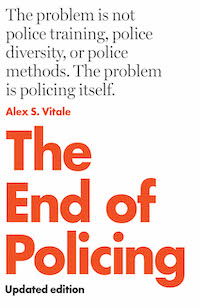The End of Policing
When we organize our society around fake meritocracy, we erase the history of exploitation and the ways the game is rigged to prevent economic and social mobility.
A central premise of this book is that policing is “a tool for managing inequality and maintaining the status quo”. This is argued with various historical examples of police action (Pennsylvania’s Coal and Iron Police, Texas Rangers, Chinese Exclusion Act, Red scare, Civil rights marches, Southern Strategy, etc.) that are scattered throughout.
This framing is used to set the scene for various problems with contemporary policing. The book take a high-level approach to introducing these issues, focusing on breadth over depth.
Some TL;DR quotes of various chapters that I valued the most:
- On policing in schools, “the overall approach of relying on armed police to deal with safety issues has led to a massive increase in arrests of students that fundamentally undermines the educational mission of schools, turning them into an extension of the larger carceral state and feeding what has come to be called the school-to-prison pipeline.”
- On the border patrol, the author argues “[w]e cannot and should not rely on ever more intensive, violent, and oppressive border policing to manage problems that we ourselves helped create.”
- On criminalizing homelessness:
Even if criminalization was successful, legal, and cost effective, it would still be unethical. We live in an economic and social environment in which the market is unable to house people at the bottom of the economic order and government is unwilling to make up the difference. Given this reality, how can we justify treating homelessness as a criminal justice issue? The law appears to be applied universally, but this fails to take into account the fact that the poor are always under greater pressure to break it and at greater risk of being subjected to legal action. As Anatole France pointed out in 1894, “In its majestic equality, the law forbids rich and poor alike to sleep under bridges, beg in the streets, and steal loaves of bread.”
The book’s title appears more strongly opinionated than its contents. The book doesn’t call for dissolution of policing in those words, but does argue that for most of the problems that police are trying to solve, police are not the solution. Instead, health programs, jobs programs, better foreign policy, etc. all solve the root problems instead of the symptoms.
We need to invest in individuals and communities and transform some of the basic economic and political arrangements in our society. Chemical dependency, trauma, and mental health issues play a huge role in undermining the safety and stability of neighborhoods. People who are suffering need help, not coercive treatment regimes or self-help pabulum; they need access to real services from trained professionals using evidence-based treatments.
Overall, the book is a broad primer for current policing practices, their histories, and areas for improvement.
